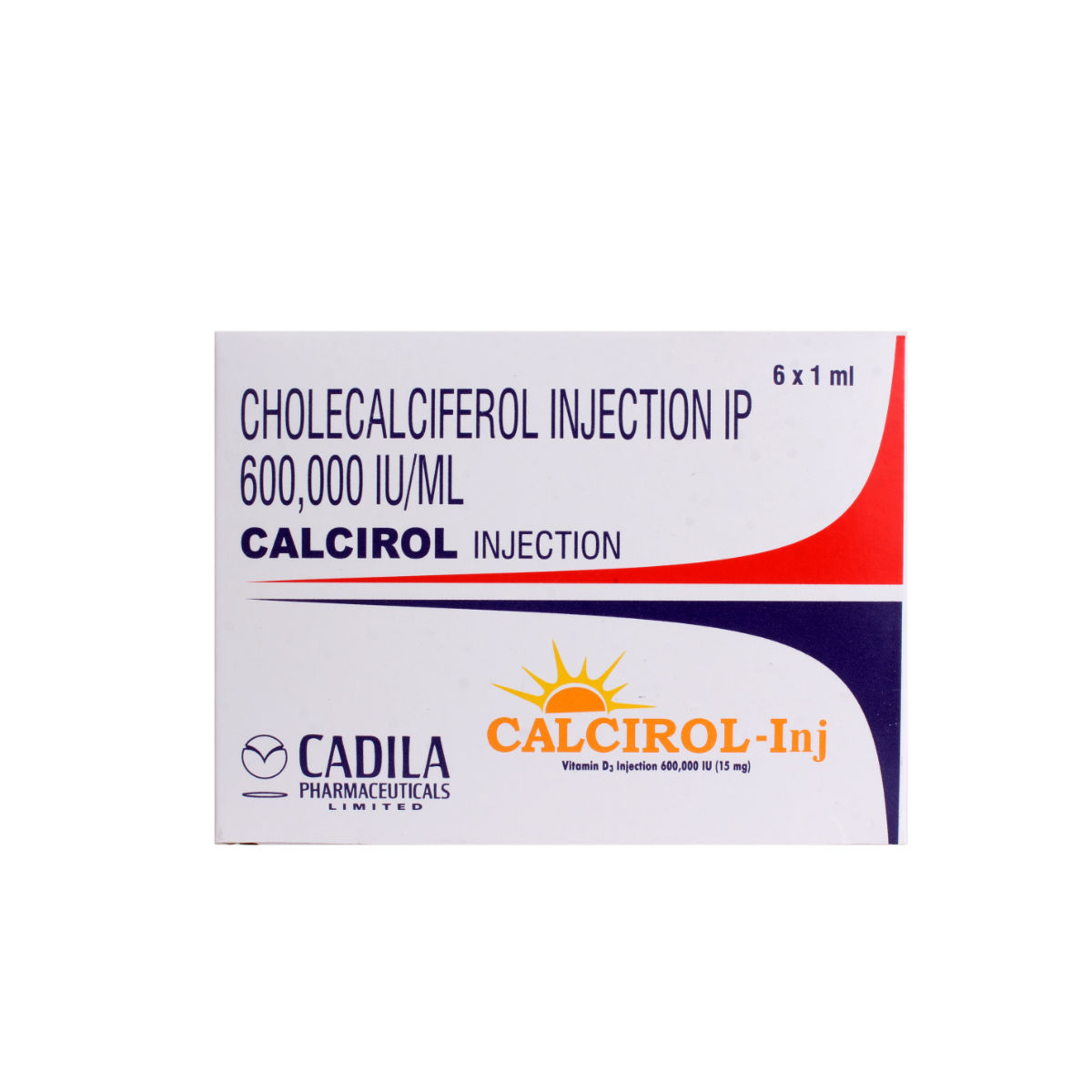Injection
₹49.5*
MRP ₹55
10% off
₹46.75*
MRP ₹55
15% CB
₹8.25 cashback(15%)
Free Delivery
With Circle membership
(Inclusive of all Taxes)
This offer price is valid on orders above ₹800. Apply coupon PHARMA10/PHARMA18 (excluding restricted items)
Know Your Delivery Time
Provide Delivery Location

Available Offers
 Prescription drug
Prescription drugWhats That

Secure Payment

India's Most Trusted Pharmacy

Genuine Products
Synonym :
Composition :
Consume Type :
Return Policy :
About Injection
Injection belongs to the class of 'Vitamins', used to regulate calcium and phosphate metabolism. Injection effectively treats various conditions in the body like Vitamin D deficiency, osteoporosis (weak and brittle bones), and rickets or osteomalacia (softening or deforming of bones due to lack of calcium). Vitamin D deficiency occurs when your body has low Vitamin D levels and is caused due to inadequate nutrition, intestinal malabsorption or lack of sunlight exposure.
Injection contains Vitamin-D3 (Cholecalciferol), a fat-soluble vitamin. It helps maintain blood calcium and phosphorus levels and the mineralization of bone. It is used to treat and prevent bone disorders, such as rickets and osteomalacia. It aids in calcium absorption enabling bone growth and repair. It further prevents cartilage degeneration. Injection is also used to maintain a healthy immune system.
Injection will be administered by a healthcare professional, do not self-administer. Your doctor will decide the dosage based on your medical condition. In some cases, it may cause side effects like pain, redness, and swelling at the site of injection. These side effects do not require medical attention and gradually resolve over time. However, if these side effects persist longer, please consult your doctor.
Injection is not recommended if you have hypercalcaemia (high calcium levels), hypervitaminosis D (high vitamin D levels), kidney stones, and calcification (high calcium levels in the body tissues). Brief your medical history to the doctor in advance if you have any heart/kidney/liver diseases, electrolyte imbalance, alcoholism, or sarcoidosis (growth of inflammatory cells in different body parts) before starting Injection. Pregnant or breastfeeding women should consult their doctor before taking Injection. This supplement is safe to use in children when prescribed by the doctor depending on the child's age and body weight.
Uses of Injection
Directions for Use
Medicinal Benefits
Injection regulates calcium and phosphate metabolism. It is used to treat vitamin D deficiency caused due to malabsorption that can be caused by chronic intestinal diseases, scarred alteration of the liver tissue (biliary hepatocirrhosis), and extended stomach or intestines resections (surgical removal).
How Injection Works
Storage
Side Effects of Injection
- Pain
- Redness
- Swelling at the site of injection
What if I have taken an overdose of Injection
Drug Warnings
Let your doctor know if you are allergic to Injection or its inactive components. Brief your medical history to the doctor in advance if you have any heart/kidney/liver diseases, electrolyte imbalance, alcoholism, or sarcoidosis before starting Injection. Please consult your doctor if you are pregnant, planning to conceive or are a breastfeeding mother before starting Injection. This supplement is safe to use in children when prescribed by the doctor depending on the child's age and body weight. Do not store Injection above 25°C.
Diet & Lifestyle Advise
- Include dairy products like milk, yoghurt, cheese or milk-based custard in your diet.
- Eat daily a serving of broccoli, cabbage, bok choy, spinach and other green leafy vegetables.
- Include the best dietary sources of vitamin D, such as fish liver oils and vitamin D–fortified milk.
- Snack on calcium-rich nuts like Brazil nuts or almonds.
- Sprinkle sesame seeds over your food, vegetables and salads. Sesame seeds are high in calcium.
- Avoid or reduce the intake of caffeine, soft drinks and alcohol that inhibit calcium absorption.
- Replace the meat with tofu or tempeh for extra calcium in your food.
Habit Forming
Therapeutic Class
Injection Substitute

Calcirol Injection 6X1 ml
₹6.23per tabletOdical D3 6L Injection 1 ml
₹54.00per tabletMore-D 600K Inj 1Ml
₹40.50per tabletMag D3 600000IU Injection
₹16.56per tabletRefocal D3 6MIU Injection
₹25.16per tablet
Product Substitutes
Alcohol
Caution
It is advised to avoid alcohol intake while on treatment with Injection to prevent any undesirable side effects.
Pregnancy
Caution
Let your doctor know if you are pregnant or planning pregnancy before taking Injection. It may be harmful to take more vitamin D than 100 micrograms (4,000 IU) per day. Your doctor will decide on the dose of this medicine based on your requirement.
Breast Feeding
Caution
The majority of medical professionals agree that vitamin D supplements up to 4,000 IU per day during lactation are safe. If you are breastfeeding, inform your doctor. Your doctor will decide the dose of Injection based on your condition.
Driving
Safe
Injection usually does not interfere with your driving ability. Do not drive or operate machinery if you experience any dizziness while using Injection. Please consult your doctor if you notice any symptoms.
Liver
Caution
Inform your doctor if you have any history of liver diseases before receiving Injection.
Kidney
Caution
Inform your doctor if you have kidney diseases like kidney stones or undergoing dialysis before receiving Injection.
Children
Consult your doctor
Please consult your doctor. Your doctor will decide the appropriate dose based on your child's condition.
FAQs
Country of origin
Disclaimer
Author Details
We provide you with authentic, trustworthy and relevant information












